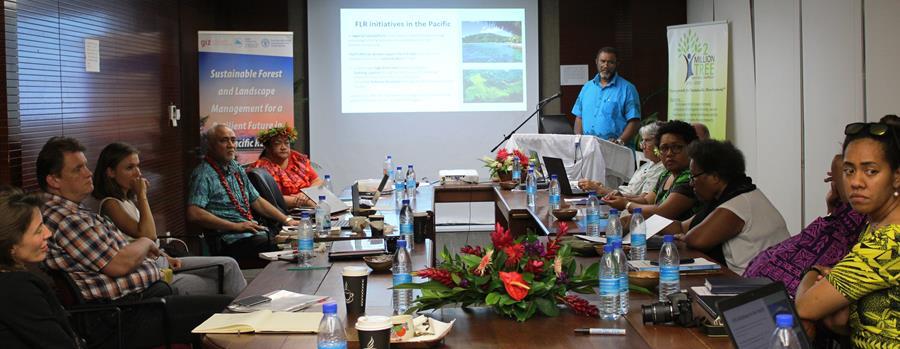Forestry leaders from around the Pacific came together at the Pacific Week of Agriculture in Samoa, and agreed to set regional targets for the United Nations Decade on Ecosystem Restoration.
Representatives from eight Pacific Island Countries and Territories agreed to area targets on forest and landscape restoration, which will contribute to global targets for slowing climate change. Reforestation and protection of native forests is one of the most effective means to achieve greenhouse gas reductions. For landowners it has strong benefits in protecting cultural values, increasing soil health and ensuring on-going supplies of timber, food and traditional medicines. Through community land use planning, tree crops are better integrated into agricultural systems, and primary forests can be managed to ensure that clean water is always available and that there is habitat for plants and animals.
Forest and Landscape Restoration is an active process that brings people together to agree on land use and areas for forest protection, revegetation and new forests within a broader pattern of land use.
The meeting, organised by the Pacific Community (SPC), the Food and Agriculture Organization of the United Nations (FAO) and German government’s GIZ, was hosted by the Government of Samoa through their Ministry of Natural Resources and Environment.
Dr Yurdi Yasmi from FAO presented an overview of the Asia-Pacific Forestry Outlook study which monitors forest changes over the past ten years. Key findings from the study show that forests are still being cleared or degraded and that primary forests must urgently be conserved and that countries need to set ambitious targets for forest landscape restoration. He noted that there is increased pressure to log forests in the Pacific region, as controls are improved in many South-East Asian countries, and that action to regenerate forests after logging must improve.
Pressures on forests come from increased population and economic development, which are further exasperated by more frequent extreme events such as droughts, wildfires and cyclones.
The meeting agreed to renew the Pacific Forest Genetic Resources strategy, which was developed more than 10 years ago to curb the loss of forest and ensure sharing of tree genetic resources in Pacific Island countries and territories. This strategy has guided the work of the Pacific Tree Seed Centre (now integrated into the Centre for Pacific Crops and Trees, CePaCT) at SPC to collect and store seeds and distribute them back to countries. These processes enable seeds from the best trees to be distributed, providing gains in preferred characteristics of growth, form of food and oil production.
By way of example, trials are currently underway with the tamanu or dilo tree (Calophyllum inophyllum) to choose trees which are better adapted to tolerate strong winds. Further research is needed to understand changing flowering patterns of trees, and the interactions with the lifecycles of insect pollinators.
The meeting provided an opportunity for Fiji, Papua New Guinea and the Solomon Islands to present updates on their progress under the REDD+ scheme. Reduction in Emissions from Deforestation and Degradation plus reforestation (REDD+) is an international scheme to improve forest sustainable management through measurement of the forest, natural regeneration and other activities that increase stored carbon (i.e. increase forest growth) and efficient use of forest resources.
Further work is being done with the support of GIZ to integrate the forestry sector into national targets for greenhouse gas emissions, continue support for the REDD+ pilot areas within each of the countries, support national forest inventories and continue the national programs in Fiji, Vanuatu, Solomon Islands and PNG.
The Forestry Technical meeting outcomes will contribute to discussions at the Pacific Heads of Agriculture and Forestry meeting, to be held on 1st and 2nd of October.
Media contact:
Elenoa Salele, Animal Health and Production Technician, Land Resources Division, Pacific Community | Email: [email protected] or M: +679 7329647
Sonal Aujla, Communications Assistant, Communications and Public Information, SPC | E: [email protected] or M: +679 9284079 (viber)
About Us:
The Pacific Community has been supporting sustainable development in the Pacific, through science, knowledge and innovation since 1947. It is the principal intergovernmental organization in the region, owned and governed by its 26 member countries and territories.
